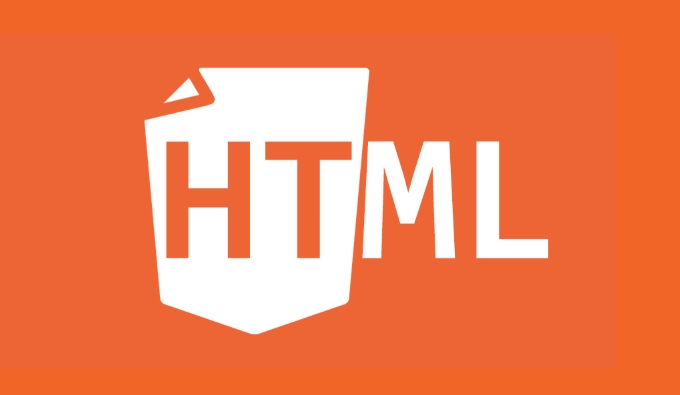How can html structure impact page loading performance?
Jul 10, 2025 pm 12:08 PMHTML structure has an important impact on page loading performance, which is mainly reflected in four aspects: First, reduce the number of DOM nodes, avoid unnecessary packaging elements and excessive use of semantic tags, and merge duplicate structures to improve parsing efficiency; Second, control the size of HTML files, and automatically optimize the structure by compressing output, avoiding inline large amounts of data, and using frameworks to automatically optimize the structure; Third, load key resources in advance, such as inline key CSS, controlling script loading with defer or async attributes, and use preload to prioritize important files; Fourth, keep the structure clear, use the title level reasonably, prefix the main content, and reduce dynamic insertion of JS to optimize SEO and first-screen rendering.

Although HTML structure itself does not directly occupy a large amount of loading resources like images or scripts, its impact on page loading performance is actually much more important than many people think. A reasonable HTML organization method can improve browser parsing efficiency, speed up the first-screen rendering speed, and even indirectly affect the optimization of key rendering paths.

Reduce the number of DOM nodes
The more DOM (Document Object Model) nodes, the longer it takes for the browser to parse and render. Especially HTML with deep nesting hierarchies and complex structures will increase memory consumption and slow down JavaScript operations.

- Avoid unnecessary packaging elements (such as multiple
<div> that do not work)<li> When using semantic tags, you should also be moderate. For example, <code><section></section>,<article></article>, etc. are good, but they should not be overused. - Merge duplicate structures. For example, if list items can be processed in a unified manner, do not write multiple block-level elements separately.
- Compress HTML output (remove whitespace, comments, etc.)
- Avoid inlining large amounts of data in HTML (such as JSON data being written directly into the page)
- Automatically optimize output structure using server-side templates or static generation tools
- Inline the critical CSS in
to avoid blocking rendering - Use
deferorasyncattribute to control script loading time - Use
<link rel="preload">to load fonts and key JS/CSS files in advance
For example: If you use 50 nested <div> to layout a simple card component, it is definitely not as efficient as adding a <code><section></section> to a few necessary child elements.
Control HTML file size
Although the HTML page itself is usually not large in size, it may also become bloated if it contains a large number of redundant comments, spaces, and duplicate code generated dynamically on the server.

For example, when building static sites, using frameworks like Gatsby or Next.js will help you with HTML compression and structure optimization by default to reduce unnecessary content.
Loading key resources in advance
HTML is the starting point for the browser to start loading other resources (such as CSS, JS, and images). By reasonably scheduling the reference order of resources in HTML, the browser can help load key content as early as possible.
For example:
<link rel="preload" href="main.css" as="style" onload="this.rel='stylesheet'">
This allows the browser to know that this style sheet is important and should be loaded first.
Keep structure clear, aiding SEO and rendering optimization
Search engine crawlers and browser rendering engines will rely on the HTML structure to judge the importance and order of page content. If the HTML structure is chaotic, it may affect the search engine crawling effect and will also cause the browser to fail to correctly recognize the content on the first screen.
- Using the correct title hierarchy (H1 → H2 → H3) is not only conducive to SEO, but also helps with barrier-free access
- Put the main content in front of HTML, not behind a bunch of ads or sidebars
- Avoid relying too much on JS to dynamically insert main content, otherwise it may cause the first time to load the "white screen" too long
In general, the impact of HTML structure on performance is fundamental. Although it is not as immediate as compressing images or splitting JS, it is an important part of optimizing the entire page loading process.
Basically that's it.
The above is the detailed content of How can html structure impact page loading performance?. For more information, please follow other related articles on the PHP Chinese website!

Hot AI Tools

Undress AI Tool
Undress images for free

Undresser.AI Undress
AI-powered app for creating realistic nude photos

AI Clothes Remover
Online AI tool for removing clothes from photos.

Clothoff.io
AI clothes remover

Video Face Swap
Swap faces in any video effortlessly with our completely free AI face swap tool!

Hot Article

Hot Tools

Notepad++7.3.1
Easy-to-use and free code editor

SublimeText3 Chinese version
Chinese version, very easy to use

Zend Studio 13.0.1
Powerful PHP integrated development environment

Dreamweaver CS6
Visual web development tools

SublimeText3 Mac version
God-level code editing software (SublimeText3)

Hot Topics
 How do I stay up-to-date with the latest HTML standards and best practices?
Jun 20, 2025 am 08:33 AM
How do I stay up-to-date with the latest HTML standards and best practices?
Jun 20, 2025 am 08:33 AM
The key to keep up with HTML standards and best practices is to do it intentionally rather than follow it blindly. First, follow the summary or update logs of official sources such as WHATWG and W3C, understand new tags (such as) and attributes, and use them as references to solve difficult problems; second, subscribe to trusted web development newsletters and blogs, spend 10-15 minutes a week to browse updates, focus on actual use cases rather than just collecting articles; second, use developer tools and linters such as HTMLHint to optimize the code structure through instant feedback; finally, interact with the developer community, share experiences and learn other people's practical skills, so as to continuously improve HTML skills.
 How do I use the element to represent the main content of a document?
Jun 19, 2025 pm 11:09 PM
How do I use the element to represent the main content of a document?
Jun 19, 2025 pm 11:09 PM
The reason for using tags is to improve the semantic structure and accessibility of web pages, make it easier for screen readers and search engines to understand page content, and allow users to quickly jump to core content. Here are the key points: 1. Each page should contain only one element; 2. It should not include content that is repeated across pages (such as sidebars or footers); 3. It can be used in conjunction with ARIA properties to enhance accessibility. Usually located after and before, it is used to wrap unique page content, such as articles, forms or product details, and should be avoided in, or in; to improve accessibility, aria-labeledby or aria-label can be used to clearly identify parts.
 How do I create a basic HTML document?
Jun 19, 2025 pm 11:01 PM
How do I create a basic HTML document?
Jun 19, 2025 pm 11:01 PM
To create a basic HTML document, you first need to understand its basic structure and write code in a standard format. 1. Use the declaration document type at the beginning; 2. Use the tag to wrap the entire content; 3. Include and two main parts in it, which are used to store metadata such as titles, style sheet links, etc., and include user-visible content such as titles, paragraphs, pictures and links; 4. Save the file in .html format and open the viewing effect in the browser; 5. Then you can gradually add more elements to enrich the page content. Follow these steps to quickly build a basic web page.
 How do I create checkboxes in HTML using the element?
Jun 19, 2025 pm 11:41 PM
How do I create checkboxes in HTML using the element?
Jun 19, 2025 pm 11:41 PM
To create an HTML checkbox, use the type attribute to set the element of the checkbox. 1. The basic structure includes id, name and label tags to ensure that clicking text can switch options; 2. Multiple related check boxes should use the same name but different values, and wrap them with fieldset to improve accessibility; 3. Hide native controls when customizing styles and use CSS to design alternative elements while maintaining the complete functions; 4. Ensure availability, pair labels, support keyboard navigation, and avoid relying on only visual prompts. The above steps can help developers correctly implement checkbox components that have both functional and aesthetics.
 How do I minimize the size of HTML files?
Jun 24, 2025 am 12:53 AM
How do I minimize the size of HTML files?
Jun 24, 2025 am 12:53 AM
To reduce the size of HTML files, you need to clean up redundant code, compress content, and optimize structure. 1. Delete unused tags, comments and extra blanks to reduce volume; 2. Move inline CSS and JavaScript to external files and merge multiple scripts or style blocks; 3. Simplify label syntax without affecting parsing, such as omitting optional closed tags or using short attributes; 4. After cleaning, enable server-side compression technologies such as Gzip or Brotli to further reduce the transmission volume. These steps can significantly improve page loading performance without sacrificing functionality.
 How do I use the element to represent the footer of a document or section?
Jun 25, 2025 am 12:57 AM
How do I use the element to represent the footer of a document or section?
Jun 25, 2025 am 12:57 AM
It is a semantic tag used in HTML5 to define the bottom of the page or content block, usually including copyright information, contact information or navigation links; it can be placed at the bottom of the page or nested in, etc. tags as the end of the block; when using it, you should pay attention to avoid repeated abuse and irrelevant content.
 How has HTML evolved over time, and what are the key milestones in its history?
Jun 24, 2025 am 12:54 AM
How has HTML evolved over time, and what are the key milestones in its history?
Jun 24, 2025 am 12:54 AM
HTMLhasevolvedsignificantlysinceitscreationtomeetthegrowingdemandsofwebdevelopersandusers.Initiallyasimplemarkuplanguageforsharingdocuments,ithasundergonemajorupdates,includingHTML2.0,whichintroducedforms;HTML3.x,whichaddedvisualenhancementsandlayout
 How do I use the tabindex attribute to control the tab order of elements?
Jun 24, 2025 am 12:56 AM
How do I use the tabindex attribute to control the tab order of elements?
Jun 24, 2025 am 12:56 AM
ThetabindexattributecontrolshowelementsreceivefocusviatheTabkey,withthreemainvalues:tabindex="0"addsanelementtothenaturaltaborder,tabindex="-1"allowsprogrammaticfocusonly,andtabindex="n"(positivenumber)setsacustomtabbing






